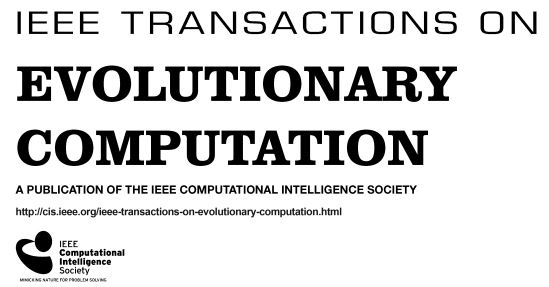随机效应下比例选择下的图式处理
IF 11.7
1区 计算机科学
Q1 COMPUTER SCIENCE, ARTIFICIAL INTELLIGENCE
引用次数: 46
摘要
遗传算法中的传统选择依赖于与观察到的适应度成比例的繁殖。这种选择方法以众所周知的图式定理所描述的形式将样本用于观察到的图式。然而,当模式适应度采用随机变量的形式时,来自现有模式的预期样本数量可能不会由模式定理描述,并且会根据所涉及的特定随机变量而变化。本文章由计算机程序翻译,如有差异,请以英文原文为准。
Schema processing under proportional selection in the presence of random effects
Traditional selection in genetic algorithms has relied on reproduction in proportion to observed fitness. This method of selection devotes samples to the observed schemata in a form described by the well known schema theorem. When schema fitness takes the form of a random variable, however, the expected number of samples from extant schemata may not be described by the schema theorem and varies according to the specific random variables involved.
求助全文
通过发布文献求助,成功后即可免费获取论文全文。
去求助
来源期刊

IEEE Transactions on Evolutionary Computation
工程技术-计算机:理论方法
CiteScore
21.90
自引率
9.80%
发文量
196
审稿时长
3.6 months
期刊介绍:
The IEEE Transactions on Evolutionary Computation is published by the IEEE Computational Intelligence Society on behalf of 13 societies: Circuits and Systems; Computer; Control Systems; Engineering in Medicine and Biology; Industrial Electronics; Industry Applications; Lasers and Electro-Optics; Oceanic Engineering; Power Engineering; Robotics and Automation; Signal Processing; Social Implications of Technology; and Systems, Man, and Cybernetics. The journal publishes original papers in evolutionary computation and related areas such as nature-inspired algorithms, population-based methods, optimization, and hybrid systems. It welcomes both purely theoretical papers and application papers that provide general insights into these areas of computation.
 求助内容:
求助内容: 应助结果提醒方式:
应助结果提醒方式:


